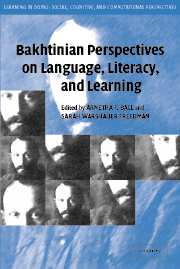Book contents
- Frontmatter
- Contents
- List of Contributors
- Acknowledgments
- PART I IDEOLOGIES IN DIALOGUE: THEORETICAL CONSIDERATIONS
- PART II VOICED, DOUBLE VOICED, AND MULTIVOICED DISCOURSES IN OUR SCHOOLS
- 5 Performance as the Foundation for a Secondary School Literacy Program: A Bakhtinian Perspective
- 6 Double Voiced Discourse: African American Vernacular English as Resource in Cultural Modeling Classrooms
- 7 Narratives of Rethinking: The Inner Dialogue of Classroom Discourse and Student Writing
- 8 Ever Newer Ways to Mean: Authoring Pedagogical Change in Secondary Subject-Area Classrooms
- Voices in Dialogue – Multivoiced Discourses in Ideological Becoming
- PART III HETEROGLOSSIA IN A CHANGING WORLD
- PART IV A CLOSING THOUGHT ON BAKHTINIAN PERSPECTIVES
- Author Index
- Subject Index
- Titles in the series
- References
5 - Performance as the Foundation for a Secondary School Literacy Program: A Bakhtinian Perspective
Published online by Cambridge University Press: 24 May 2010
- Frontmatter
- Contents
- List of Contributors
- Acknowledgments
- PART I IDEOLOGIES IN DIALOGUE: THEORETICAL CONSIDERATIONS
- PART II VOICED, DOUBLE VOICED, AND MULTIVOICED DISCOURSES IN OUR SCHOOLS
- 5 Performance as the Foundation for a Secondary School Literacy Program: A Bakhtinian Perspective
- 6 Double Voiced Discourse: African American Vernacular English as Resource in Cultural Modeling Classrooms
- 7 Narratives of Rethinking: The Inner Dialogue of Classroom Discourse and Student Writing
- 8 Ever Newer Ways to Mean: Authoring Pedagogical Change in Secondary Subject-Area Classrooms
- Voices in Dialogue – Multivoiced Discourses in Ideological Becoming
- PART III HETEROGLOSSIA IN A CHANGING WORLD
- PART IV A CLOSING THOUGHT ON BAKHTINIAN PERSPECTIVES
- Author Index
- Subject Index
- Titles in the series
- References
Summary
Nothing is so practical as a good theory.
– James BrittonThe theories of M. M. Bakhtin, philosopher of language, literary critic, and social theorist, have had wide influence in and beyond the academy. Writing in Russia in the years between 1920 and 1960, the period of the Russian Revolution and the rise of the Soviet state, and deeply influenced by those events, Bakhtin's project was to explore and challenge the formalist theories developed by the linguists and literary critics like Saussure and Jakobson. Language, Bakhtin argued, is never a fixed and closed system. Instead, it is a living, ever-changing entity, “social throughout its entire range and in each and every of its factors, from the sound image to the furthest reaches of abstract meaning” (Bakhtin, 1981, p. 259).
If Bakhtin's formulations are useful – and the extent to which they have been taken up and explored in the West since the 1980s suggests they are – there are relevant questions to be addressed: how do these formulations apply in settings whose explicit purpose is to support students' language and literacy development (i.e., schools)? To what extent do school settings promote learning through social interaction? What sorts of social interaction take place in those settings? How can we use Bakhtin's insights to provide a richer, more equitable environment for literacy teaching and learning?
Information
- Type
- Chapter
- Information
- Bakhtinian Perspectives on Language, Literacy, and Learning , pp. 107 - 128Publisher: Cambridge University PressPrint publication year: 2004
References
Accessibility standard: Unknown
Why this information is here
This section outlines the accessibility features of this content - including support for screen readers, full keyboard navigation and high-contrast display options. This may not be relevant for you.Accessibility Information
- 10
- Cited by
